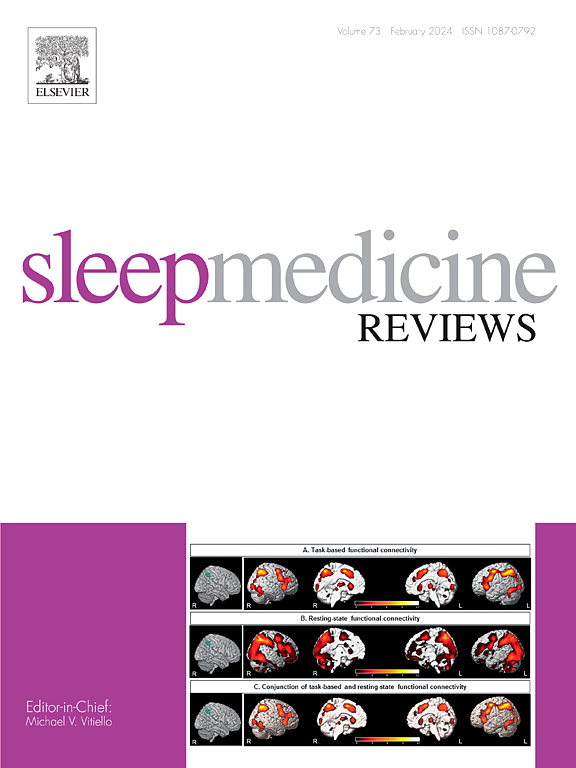认知行为疗法治疗酒精中毒性失眠症:系统回顾和荟萃分析。
IF 9.7
1区 医学
Q1 CLINICAL NEUROLOGY
引用次数: 0
摘要
失眠在酒精使用障碍(AUD)患者中很普遍,这可能会破坏治疗并增加复发的风险。失眠认知行为疗法(CBT-I)是推荐的失眠一线治疗方法,但其在各种AUD患者中的疗效尚不明确。本荟萃分析的目的是量化CBT-I在改善重度饮酒和/或不同程度的AUD严重程度和合并症失眠的成年人的失眠严重程度和酒精相关结果方面的有效性。系统检索MEDLINE、Cochrane Library、PsycINFO和ClinicalTrials.gov(截至2024年2月)以检索随机对照试验(RCTs)。我们进行了多水平荟萃分析,以估计失眠严重程度随时间的平均差异,使用失眠严重程度指数(ISI)测量,以及在CBT-I和对照组之间的酒精渴望和酒精相关的社会心理问题。对于重度饮酒/戒酒天数,估计发病率比。使用风险偏倚2 (RoB 2)工具评估偏倚风险。纳入8项随机对照试验,共纳入426名成年人(68.78%为男性)。与对照组相比,CBT-I导致治疗后失眠严重程度大幅降低[估计ISI降低= -5.51,95% CI(-7.13至-3.90)],并维持在1至3个月[7项研究;估计= -4.39,95% CI(-6.08至-2.70)],6个月随访[4项研究;估计= -4.55,95% CI(-6.77至-2.33)]。与酒精相关的结果报告不太一致,没有发现显著差异。纳入的试验在评估所有结果时被判定为低或中等偏倚风险。CBT-I有效地降低了整个AUD范围内的失眠严重程度,支持在AUD预防和治疗环境中广泛实施。普洛斯彼罗注册号:crd42023464612。本文章由计算机程序翻译,如有差异,请以英文原文为准。
Cognitive behavioral therapy for insomnia across the spectrum of alcohol use disorder: A systematic review and meta-analysis
Insomnia is prevalent among patients with alcohol use disorder (AUD), potentially undermining treatment and increasing the risk of relapse. Cognitive behavioral therapy for insomnia (CBT-I) is the recommended first-line treatment for insomnia, but its efficacy is not well-characterized in patients across the spectrum of AUD. The aim of this meta-analysis was to quantify the effectiveness of CBT-I in improving insomnia severity and alcohol-related outcomes in adults with heavy alcohol use and/or varying levels of AUD severity and comorbid insomnia. MEDLINE, Cochrane Library, PsycINFO and ClinicalTrials.gov were systematically searched (up to February 2024) to retrieve randomized controlled trials (RCTs). Multilevel meta-analyses were conducted to estimate mean differences over time in insomnia severity, measured using the Insomnia Severity Index (ISI), as well as in alcohol craving and alcohol-related psychosocial problems between CBT-I and control groups. For the number of heavy-drinking/abstinent days, incidence rate ratios were estimated. Risk of bias was assessed using the Risk of Bias 2 (RoB 2) tool. Eight RCTs encompassing 426 adults (68.78 % men) were included. Compared with control conditions, CBT-I resulted in a large reduction of insomnia severity post-treatment [estimated ISI reduction = −5.51, 95% CI (−7.13 to −3.90)], which was maintained at 1-to-3-month [7 studies; estimate = −4.39, 95% CI (−6.08 to −2.70)], and 6-month follow-up [4 studies; estimate = −4.55, 95% CI (−6.77 to −2.33)]. Alcohol-related outcomes were reported less consistently, and no significant differences were found. The included trials were judged to have a low or moderate overall risk of bias for the assessment of all outcomes. CBT-I effectively reduces insomnia severity across the spectrum of AUD, supporting wide implementation in AUD prevention and treatment settings.
PROSPERO registration number
CRD42023464612.
求助全文
通过发布文献求助,成功后即可免费获取论文全文。
去求助
来源期刊

Sleep Medicine Reviews
医学-临床神经学
CiteScore
20.10
自引率
3.80%
发文量
107
期刊介绍:
Sleep Medicine Reviews offers global coverage of sleep disorders, exploring their origins, diagnosis, treatment, and implications for related conditions at both individual and public health levels.
Articles comprehensively review clinical information from peer-reviewed journals across various disciplines in sleep medicine, encompassing pulmonology, psychiatry, psychology, physiology, otolaryngology, pediatrics, geriatrics, cardiology, dentistry, nursing, neurology, and general medicine.
The journal features narrative reviews, systematic reviews, and editorials addressing areas of controversy, debate, and future research within the field.
 求助内容:
求助内容: 应助结果提醒方式:
应助结果提醒方式:


